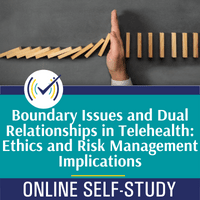Boundary Issues and Dual Relationships in Telehealth: Ethics and Risk Management Implications
Enroll in the Online Self-Study
3.5 Ethics CE Credits available for behavioral health clinicians
Telehealth has introduced a wide array of novel boundary and dual relationship issues in behavioral health. Traditional approaches to these issues must be expanded to address ethical challenges in the digital age. How should I manage clients who search online and find personal information about me on the internet? Is it ethical for me to search online for information about my clients without their knowledge or consent? Is it ever appropriate to be online social networking "friends" with a client or former client? Can I provide telehealth services to a former Facebook friend? What risks are associated with "after hours" online and digital communications with clients? Dr. Frederic Reamer will explore these and other boundary and dual relationship issues in telehealth. He will explore the implications of prevailing ethics standards and discuss ways to protect clients and help prevent ethics-related lawsuits and licensing board complaints.
- Boundary Issues and Dual Relationships in Telehealth
- Description
- Learning Objectives
- Instructor
- CE Hours
- How to Complete the Course and Earn CEs
- Course Policies
- Who Should Attend
- Teaching Methods
- Course Availability
Select each tab above to view specific details of this course
Telehealth has introduced a wide array of novel boundary and dual relationship issues in behavioral health. Traditional approaches to these issues must be expanded to address ethical challenges in the digital age. How should I manage clients who search online and find personal information about me on the internet? Is it ethical for me to search online for information about my clients without their knowledge or consent? Is it ever appropriate to be online social networking "friends" with a client or former client? Can I provide telehealth services to a former Facebook friend? What risks are associated with "after hours" online and digital communications with clients? Dr. Frederic Reamer will explore these and other boundary and dual relationship issues in telehealth. He will explore the implications of prevailing ethics standards and discuss ways to protect clients and help prevent ethics-related lawsuits and licensing board complaints.
This course was recorded March 23, 2022
Upon completion of this training professionals will be able to do the following:
- Identify boundary and dual relationship issues associated with telehealth.
- Apply relevant ethics, regulatory, and practice standards to manage boundary and dual relationship challenges.
- Design and implement protocols to protect clients.
- Design and implement protocols to help prevent ethics-related litigation and licensing board complaints.
Dr. Frederic G. Reamer, Ph.D.
Frederic Reamer is professor in the graduate program, School of Social Work, Rhode Island College, where he has been on the faculty since 1983. His teaching and research focus on professional ethics, criminal justice, mental health, health care, and public policy. Dr. Reamer received his Ph.D. from the University of Chicago and has served as a social worker in correctional and mental health settings. He chaired the national task force that wrote the Code of Ethics adopted by the National Association of Social Workers in 1996 and served on the code revision task force. Dr. Reamer also chaired the national task force sponsored by the National Association of Social Workers, Association of Social Work Boards, Council on Social Work Education, and Clinical Social Work Association that developed technology standards for the profession. Dr. Reamer has lectured nationally and internationally on social work and professional ethics, including in India, China, Singapore, South Korea, Japan, Taiwan, and in various European nations. His books include Social Work Values and Ethics; Risk Management in Social Work; The Social Work Ethics Casebook; Ethical Standards in Social Work; Boundary Issues and Dual Relationships in the Human Services; Ethics and Risk Management in Online and Distance Behavioral Health; Moral Distress and Injury in Human Services; and The Social Work Ethics Audit, among others. Dr. Reamer has served as an expert witness in many court and licensing board cases throughout the United States. Read more about Dr. Reamer here
Credit Hours: This course consists of 3.5 ethics credit hours.
Counselors: Telehealth Certification Institute, LLC has been approved by NBCC as an Approved Continuing Education Provider, ACEP No, 6693. Programs that do not qualify for NBCC credit are clearly identified. Telehealth Certification Institute, LLC is solely responsible for all aspects of the programs.
Telehealth Certification Institute, LLC is recognized by the New York State Education Department's State Board for Mental Health Practitioners as an approved provider of continuing education for licensed mental health counselors. #MHC-0048. Approval renewal date: 1/31/2026
Marriage and Family Therapists: Many MFT licensing boards accept our courses or one of the approvals which we have from professional associations. You can check with your board to determine if this course would be accepted by your licensing board.
Social Workers: Telehealth Certification Institute LLC, #1609, is approved to offer social work continuing education by the Association of Social Work Boards (ASWB) Approved Continuing Education (ACE) program. Organizations, not individual courses, are approved as ACE providers. State and provincial regulatory boards have the final authority to determine whether an individual course may be accepted for continuing education credit. Telehealth Certification Institute LLC maintains responsibility for this course. ACE provider approval period: 05/02/2021 – 05/02/2024. Social workers completing this course receive 3.5 ethics continuing education credits.
Telehealth Certification Institute, LLC is recognized by the New York State Education Department's State Board for Social Work as an approved provider of continuing education for licensed social workers #SW-0435. Approval renewal date: 2/28/2023
Addiction Professionals: Telehealth Certification Institute is an approved provider of continuing education by NAADAC, The Association for Addiction Professionals, provider #193104. Full attendance is required; no partial credit will be awarded for partial attendance.
Psychologists: Telehealth Certification Institute LLC is approved by the American Psychological Association to sponsor continuing education for psychologists. Telehealth Certification Institute LLC maintains responsibility for this program and its content.
Telehealth Certification Institute, LLC is recognized by the New York State Education Department’s State Board for Psychology as an approved provider of continuing education for licensed psychologists #PSY-0128. Effective 8/31/2021 – 8/31/2024
Art Therapists: Telehealth Certification Institute, LLC is recognized by the New York State Education Department's State Board for Mental Health Practitioners as an approved provider of continuing education for licensed creative arts therapists #CAT-0093. 7/21/2021 – 7/31/2024
Other Professionals: This activity qualifies for 210 minutes of instructional content as required by many national, state and local licensing boards and professional organizations. Retain your certificate of completion and contact your board or organization for specific filing requirements.
To receive your certificate of completion you must complete the course in its entirety.
To complete an Online Self Study Course, one must register, log in, select the My Courses option from the menu items, click the Course Title, complete all of the modules, complete and pass the post-test(s), and complete the course evaluation.
Psychologists and other professionals seeking CE credit through our approval with the American Psychological Association are asked but not required to complete the course evaluation before obtaining their certificate of completion, however passing a post-test for online self-study courses, and submitting one's attendance for live on-site and live webinars is required.
You can download or print your certificate of completion by logging into your account, navigating to the course by selecting the My Courses option from the menu items, clicking the Course Title, scrolling to the Certificate of Completion section, and clicking on the Certificate of Completion link to either download it or print it.
Directions for completing a course can be found by clicking here.
Accommodations for Individuals with Disabilities
Click here to view our Accommodations for Individuals with Disabilities.
Cancellation Policy
Refunds are offered within the first 30 days for courses which have not been completed. There is a $25 service fee for refunds.
Grievance Policy
This course is intended for clinicians who provide behavioral health services.
Teaching methods for this course include recorded lectures, videos, a post-test, and a course evaluation. The course may include required reading.
This program was recorded on March 23, 2022
You have six months to access online courses from the time of purchase.

Frederic G. Reamer
Ph.D.
Frederic G. Reamer, Ph.D.
Frederic Reamer is professor in the graduate program, School of Social Work, Rhode Island College, where he has been on the faculty since 1983. His teaching and research focus on professional ethics, criminal justice, mental health, health care, and public policy. Dr. Reamer received his Ph.D. from the University of Chicago and has served as a social worker in correctional and mental health settings. He chaired the national task force that wrote the Code of Ethics adopted by the National Association of Social Workers in 1996 and served on the code revision task force. Dr. Reamer also chaired the national task force sponsored by the National Association of Social Workers, Association of Social Work Boards, Council on Social Work Education, and Clinical Social Work Association that developed technology standards for the profession. Dr. Reamer has lectured nationally and internationally on social work and professional ethics, including in India, China, Singapore, South Korea, Japan, Taiwan, and in various European nations. His books include Social Work Values and Ethics; Risk Management in Social Work; The Social Work Ethics Casebook; Ethical Standards in Social Work; Boundary Issues and Dual Relationships in the Human Services; Ethics and Risk Management in Online and Distance Behavioral Health; Moral Distress and Injury in Human Services; and The Social Work Ethics Audit, among others. Dr. Reamer has served as an expert witness in many court and licensing board cases throughout the United States. Read more about Dr. Reamer here.




The course was so informative and I was glued to my screen for the entire duration. I received so much knowledge concerning ethics in telehealth and I am greatly encouraged to read about all the standards and policies that pertain to my practice. Thank you!.